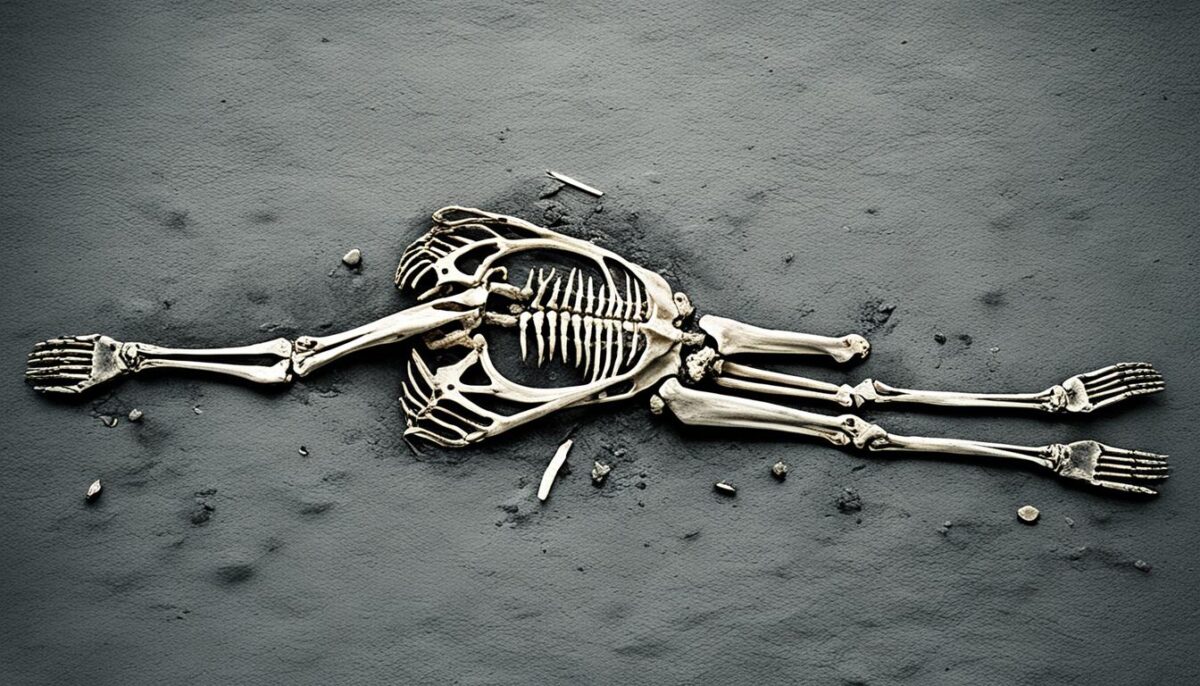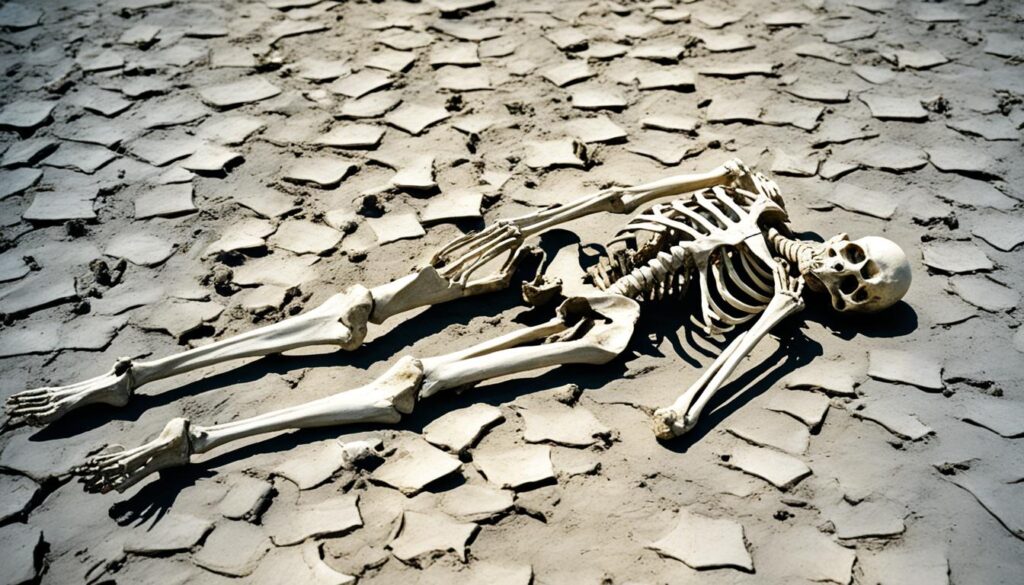In a world where food is abundant, we often overlook its role in keeping us alive. But have you ever wondered how long someone can stay alive without food? It’s a question that sparks curiosity and amazement as we hear incredible stories of survival. The truth is, the science behind starvation is not as simple as we might think. So, what is the safe limit for going without food, and what happens when that limit is exceeded?
It’s hard to pinpoint the exact time a person can survive without food. We do know of cases where individuals have made it between 8 and 21 days without eating or drinking.1 This idea comes from survival situations, like being trapped and buried, where it’s not okay to test these limits on purpose. How long someone lasts without food or water changes with their age, health, and if they can drink something else.
Key Takeaways
- A well-nourished male can technically survive between 1 and 3 months without food, but hunger strikers have died after 45-61 days, suggesting 3 months is unlikely.1
- Factors like age, sex, body size, fitness, health, and activity level affect how long a person can go without food.1
- Drinking water early on can prolong survival during starvation.1
- Severe dehydration can lead to life-threatening symptoms like lethargy, unconsciousness, and weak pulse.1
- Starvation diets are dangerous and unsustainable, as they can slow metabolism and lead to a drop in calorie burn.1
Understanding Starvation and Its Effects
When the body lacks calories, it changes to burn less energy.2 Without food, life can be lost. The time one can survive without eating varies. It depends on the person and their situation.
Definition of Starvation
We need food and water to live. Food gives us energy and water keeps us hydrated. For our bodies to work well, we need a balanced diet and enough water daily.
Why the Body Needs Food for Survival
In extreme cases like hunger strikes, life expectancy without food is around a week.2 Those getting water but no food might survive 2 to 3 months.2 Not eating can shorten your life.
Factors Affecting Survival Time Without Food
A 70-kilogram man has stores that let him live 1 to 3 months without eating.1 But some died 45–61 days into a hunger strike, showing 3 months is unlikely.1 The brain uses a lot of energy. If it doesn’t get enough, you might have trouble thinking clearly or sleeping.1
Stopping menstruation, weaker bones, slower metabolism, and feeling cold can happen without the right fats and cholesterol.1 With little water, you might feel very thirsty, restless, and have less urine. Not enough water could be deadly, leading to fainting and other serious conditions.1
Extreme low-calorie diets are harmful. They slow your metabolism and leave you lacking nutrients.1
Survival Time Without Food: Real-World Observations
In 1981, hunger strikers in the Maze Prison, Belfast, passed away after 45–61 days without food.2 If you’re underweight, which means you have a BMI below 18.5, your risk of malnutrition goes up. This can lead to many health issues and could lower how long you’ll live. A study from 2018 shared that being underweight might take 4.3 years off a man’s life and 4.5 years off a woman’s.2
Impact of Water Intake on Survival Time
People can stay alive without food for weeks or months if they have enough water.2 Without food, the body can use its stores to keep you going longer if you drink water. In 1997, experts looked at hunger strikers and said they’d need 1.5 liters of water daily to last longer without food.2
How the Body Adapts to Lack of Food
After about 24 hours of not eating, your body starts changing how it gets energy. First, it uses up stored glucose. Then, it turns to glycogen in your liver and muscles for energy.
By the second day with no food, your glucose and glycogen are gone. Now, your body turns to burning muscle for fuel. But, your body tries hard to keep your muscles safe.
So, this phase gives you energy while important changes happen in your body.
Metabolic Changes During Starvation
The body starts using its fat stores to create ketones for energy to save muscle.3 In the first 5 days without food, you could lose 1–2 kilograms (2.2–4.4 pounds) every day.2 Most of this is just water and lost minerals. After a few weeks, you start losing less weight, down to about 0.3 kilograms (0.7 pounds) each day.
Breakdown of Body Tissues for Energy
3 Eight people living alone in a tough environment lost 15% of their body weight. They burned 750 kilojoules (180 kilocalories) less each day. The lower energy use was mostly due to losing muscles and body fat, and also less fidgeting.
3 The brain is a big energy user, needing up to 1,360 kilojoules (324 kilocalories) a day. After a few days with no food, it starts getting most of its energy from ketones. It needs glucose to work, and your body can make this from breaking down proteins.
3 In very obese people, starvation can lead to protein depletion and death before they run out of fat. The brain mainly uses ketones for energy. Even without food, the brain can function well for a while because of ketones.
Impact of Starvation on Body Systems
When the body doesn’t get food, it starts using its own tissue for energy. This can include muscle, including the heart muscle. As a result, the heart might not pump as effectively. Then, the pulse and blood pressure drop. This can eventually lead to heart failure.2
Effects on the Cardiovascular System
Not eating can mess with how your stomach works. You might feel bloated, have stomach pain, throw up, feel sick, and your blood sugar can change a lot. This, plus not eating enough for a long time, can also make you constipated. It does this by making the intestines’ muscles weak.2
Effects on the Gastrointestinal System
Starving your body can also mess with your brain. You might find it hard to focus and have trouble sleeping. The brain uses a lot of your body’s energy.1
Effects on the Central Nervous System
Your brain and body also need fat and cholesterol to work right. Not eating enough of these can mess with your hormones. This can make your periods weird or stop, weaken your bones, slow down your metabolism, and give you hypothermia.1
Effects on the Endocrine System
How Long Can You Go Without Water?
In hot weather, an adult might survive a few days without water. But a child left in a hot car could die from dehydration within hours.4 A person can live without food for up to three weeks. But without water, survival is only 3 to 5 days.4 Signs of moderate dehydration include a dry mouth, feeling restless, and urinating less.
Severe Dehydration and Life-Threatening Risks
Severe dehydration has serious effects, like feeling very tired, passing out, and not peeing. Other signs are a dry mouth, low blood pressure, and weak or no urine.4 You can’t live longer than four days without both food and water.4 It’s a condition that can kill you.
The Dangers of Starvation Diets
Starvation diets are not a good way to lose weight. If someone is eating too little, their body burns fewer calories. This can lead to fainting, dizziness, and other bad health issues.
It’s really hard to keep on starving yourself over time. Such diets can make your body store more fat. Plus, they bring a lot of health problems. So, they’re not good for losing weight for good.
Instead, doctors say to eat well and exercise regularly for weight loss. Starving yourself is never a safe choice for managing your weight.
| Risks of Starvation Diets | Healthy Weight Loss Strategies |
|---|---|
|
Bottom line, starvation diets are risky and not the way to go. Choosing a healthy lifestyle with good eating and exercise is the way to keep the weight off for good.
How Long Can You Go Without Food?
Average Survival Time Estimate
A well-nourished, 154-pound man can survive 1 to 3 months with no food.1 But, in hunger strikes, death has occurred at 45 to 61 days. This shows 3 months is doubtful.1
Individual Variations and Factors
Many things impact how long you can survive without food. Age, sex, body size, fitness, and health are key.5 The amount of liquid intake is crucial. Drinking water early might help you last longer without food.1
In some rare cases, people have lived 61 days without eating. But, most can only go 8 to 21 days.2 With water, survival extends to 2 or 3 months.2 Yet, factors like age, sex, and starting weight impact this.5
During the first 5 days without food, you could lose 2.2 to 4.4 pounds each day.2 If your BMI is under 18.5, your life might be 4.3 to 4.5 years shorter.2 Watch for bad effects after a 10% weight loss or at a BMI of 16.5 or lower.2
Experts say surviving a week without food or water is the maximum.2 Using muscle for energy in starvation has bad signs.2 After, heart problems, nerve issues, swelling, and electrolyte imbalances might occur.2
Risks and Long-Term Effects of Starvation
Reports say that people can go without food for days or weeks in some cases.2 But, when you starve, your body starts to break down. This can cause many problems like feeling faint or dizzy, changes in thinking, and even heart issues.
Organ Failure and Other Complications
If someone doesn’t eat enough or starves, they could face problems for a long time. Think things like not growing as much, weak bones, and even mental health struggles.2 And if they starve for a while then eat normally again, their body can get very sick. This illness is called refeeding syndrome, and it can be very dangerous.
Refeeding Syndrome and Precautions
After not eating enough, it’s best to start eating again slowly. Going fast can cause big problems. These problems include bad heart or brain conditions, and not balancing the right chemicals in the body.2 Drink plenty of water every day. This simple step can help you survive without food for a longer time.2
Safe and Sustainable Weight Loss Strategies
If you want to shed pounds, team up with a pro for a safe plan. The best weight loss paths mix a healthy diet and regular workouts. Avoid extreme diets as they can harm you.6
Try to drop 1 to 2 pounds a week for real progress.6 Focus on whole foods like fruits and veggies, and grains. They cut calories while giving you must-have nutrients.6 Also, walk fast or do steady exercise for 30 minutes most days to help lose weight steadily.6
Sticking to a weight loss over time happens with exercise.6 Starting with a 5% reduction of your current weight is a good aim.6 Stick with smart eating and activity, and you’ll reach your goal the right way.
Providing Nutritional Support to Those in Need
Global Hunger and Malnutrition
In our world, there’s more than enough food for everyone. Yet, many face the risk of starvation.2 Helping our neighbors eat is a duty we share. Embrace Relief helps by giving food to people in Yemen. About 15 million Yemenis lack enough food and face the risk of starvation.
Embrace Relief’s Hunger Relief Efforts
Embrace Relief gives food packets to families in Yemen. Each packet has enough food for two weeks for a family of six.2 They have supported over 40 countries with food over ten years.
Conclusion
The human body can handle a lot, but not eating can cause real harm. If you go without food for days or weeks, you could get very sick. You might even die. The time it takes to get sick from not eating depends on different things, like how old you are and if you are fit. Some healthy people can last a few weeks without food. Others might make it up to ten weeks. It shows how tough our bodies are, even in hard times.7
Embrace Relief is all about helping people get the food they need. We work to fight hunger and make sure people have enough to eat. We help by giving good advice on eating, like having meals with healthy foods every 4-6 hours. Also, we make sure there is enough protein, fruits, and veggies in these meals. Our goal is to stop the bad effects of not having enough food. We want to help communities and people be healthy by providing good food.8
The fact that people can survive without food shows how strong they are. But, this also shows that having good food is super important. Embrace Relief is focused on doing good and making sure no one starves. We are here to help and make a difference.8
FAQ
How long can a person survive without food?
A person can live without food or drink for 8 to 21 days, recorded in history. The actual time varies due to factors like age and health. Access to water is critical.
What happens to the body during starvation?
In severe starvation, the body decreases the energy it uses. This can result in muscle loss, organ failure, and eventually, death.
How does water intake affect survival time during starvation?
Some have survived several weeks without food but with water. Water prolongs survival since the body can better manage the lack of food than water.
How does the body adapt to lack of food?
After 24 hours without food, the body changes glycogen into glucose. This starts the energy provision. On the second day, it breaks down muscle. Later, it uses fat for energy.
What are the effects of starvation on the body’s systems?
Starvation severely impacts many body systems like the heart and brain. It causes heart failure, indigestion, changes in thinking, and hormonal issues.
How long can a person survive without water?
A fit adult may last a few days without water. Yet, a child in a hot car could die within hours. Lack of water leads to lethargy, unconsciousness, and death.
Why are starvation diets dangerous?
Starvation diets harm the body and aren’t safe. They slow metabolism, cause muscle loss, and create health problems. Health experts suggest losing weight through a balanced diet and exercise.
How long can a person typically survive without food?
An adult male well-nourished could have enough energy stored for 1 to 3 months. Yet, voluntary fasting has led to death in 45–61 days. Thus, 3 months without eating is unlikely.
What are the long-term effects of starvation?
Starvation or limited food over time can cause lasting harm like poor growth and mental issues. People must slowly resume eating to prevent refeeding syndrome.
Source Links
- https://www.medicalnewstoday.com/articles/how-long-can-you-go-without-food
- https://www.healthline.com/health/food-nutrition/how-long-can-you-live-without-food
- https://en.wikipedia.org/wiki/Starvation_response
- https://www.medicinenet.com/how_long_does_it_take_to_die_if_you_dont_eat/article.htm
- https://www.verywellhealth.com/how-long-live-without-food-1132033
- https://www.mayoclinic.org/healthy-lifestyle/weight-loss/in-depth/weight-loss/art-20047752
- https://en.wikipedia.org/wiki/Hunger_(physiology)
- https://louisville.edu/medicine/departments/familymedicine/files/L081611.pdf



